In conversation with Dr Helen Skirrow, Lena Choudary-Salter and Habiba Haque
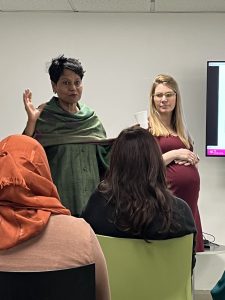
A recap on our research project
Not enough children in the local area around Church Street, Westminster, London where the Mosaic Community Trust is based get their routine vaccines. We therefore worked together on our project that Lena Choudary-Salter (Mosaic’s CEO) named ‘Why did nobody ask us?!’ to reflect that local parents’ views who live in an area of low vaccine uptake had not previously been listened to. We have written about our partnership working before. Children missing out on their routine vaccines is a problem not just in Church Street but in lots of areas of London and other urban areas of the UK, which are poorer and have more ethnically diverse populations. For example, the measles outbreaks in London and the West Midlands are because not enough children have had their measles, mumps and rubella (MMR) vaccines This means children are at risk of becoming ill and some may have to be admitted to hospital with dangerous complications from measles.
How did you carry out your research?
Mosaic is embedded in the local community and through our partnership we have heard from women who would not normally participate in research. Mosaic community workers helped the women to complete the questionnaire survey and co-facilitated, (after training), the focus groups we held with parents. As well as Lena, Habiba Haque (Mosaic Learning and Development Lead) was instrumental to the project in terms of organisation, recruiting parents to complete the questionnaire and focus groups and co-facilitating focus groups. Having Habiba co-facilitate focus groups helped ensure local women who took part felt comfortable, understood the questions and also were encouraged to share their honest thoughts and perspectives. Louise Hall (Mosaic Community Engagement Lead) was also essential to the smooth running of the project and her strong community links with local parents and schools have been integral to the study’s recruitment. Through co-production we heard the perspectives of ethnic minority parents whose children are less likely to be vaccinated and less likely to be involved in research.
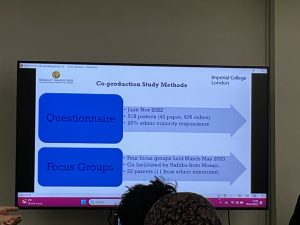
Tell us about the training Mosaic community workers received during your project?
Before any event or session we ensured that everyone agreed the terminology we were using and that any questions were addressed. Dr Celine Lewis from University College London, an expert in qualitative research and one of Helen Skirrow’s supervisors delivered focus group training to Mosaic at the local children’s centre in Westminster where Mosaic meets.
What did your research find?
We found that parents:
- think vaccinating their children is important but also find it difficult to book vaccine appointments or take their children to be vaccinated
- have questions about routine childhood vaccines and want answers or more information to be given through conversations with health professionals whom they trust and know
- felt that they wanted to have a conversation about their children’s vaccines (not just a leaflet) with someone who speaks their own language to ensure their questions were answered
- and particularly ethnic minority parents, have more questions about vaccines because of the Covid-19 pandemic
We shared with lots of local stakeholders that parents think the following things would help more children get vaccinated:
- improving access to vaccine information; and
- improving access to vaccine appointments
What impact did the co-produced research have on the community?
The local community and all of Mosaic’s programme team have increased their understanding of participatory research and co-production through meaningful engagement and involvement. The immediate benefits have been:
- increased understanding of childhood vaccination
- increased confidence in sharing their and the communities’ thoughts and experiences by being part of the research team. The local mothers involved in the research now feel that their voice, knowledge, and experience is valued and in fact needed to improve their local services. The training and experience the community members received has enabled them to take part confidently and enthusiastically in other similar research collaborations and community level public consultation meetings.
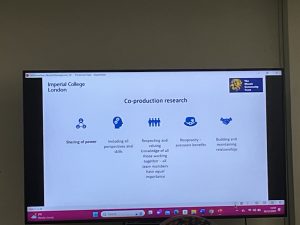
In 2023 Mosaic received the Imperial College President’s Award for Inspirational Partner (Team) for Excellence in Societal Engagement and is involved in lots more co-production research projects moving forward! The annual President’s Awards for Excellence and Imperial Garden party was held on 6 July 2023 to celebrate all staff and students who have been nominated by their managers, peers and colleagues for their vital contributions to the College over the last academic year. It also recognises staff who have supported important projects, provided excellent service and taken on new challenges. The annual President’s Awards for Excellence and Imperial Garden party was held on 6 July 2023 to celebrate all staff and students who have been nominated by their managers, peers and colleagues for their vital contributions to the College over the last academic year. It also recognises staff who have supported important projects, provided excellent service and taken on new challenges.
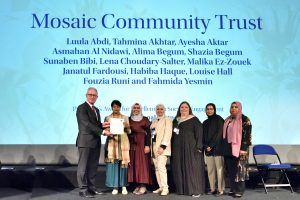
What was the most challenging part of doing co-produced research and how did you overcome it?
The most challenging part for Helen was learning to completely trust Mosaic’s way of working – Helen learnt that you must be adaptive and flexible when collaborating with a community organisation. If researchers want true co-production and collaborative relationships, they must change to work alongside and with community organisations. This means changing meetings to go to local venues and, for example, not setting up Microsoft office meetings on days of the week that suit your research project teams’ calendars! Researchers should respect that community organisations like Mosaic are busy running projects with local communities. You may have to attend their community sessions and tag your meetings on at the end, but by being flexible you learn so much more!
A challenge in developing the questionnaire we used was that it ended up being quite long because we were trying to ask about all factors that might influence whether children are vaccinated and include everyone’s perspective. In future, we would aim for a shorter questionnaire.
What advice would you give other researchers interested in co-producing research?
The basic principle we followed in defining and implementing a community based and community participated co-produced research was using a “bottom-up” model. Whether it was conceptualising the research outline, developing the methodologies or the survey questionnaires, Helen was actively aware of the need to be led by the participants and the participating community based organisation. Such an approach enhanced the current implementation study model, which required the active and honest participation of the respondents,
Co-production should not be about a one-off project but instead be about developing a longstanding relationship with community members with whom you want to work. It takes time to develop those relationships and cannot be done quickly: Mosaic and Helen have now worked together since 2018. Long term relationships can be difficult given many funders give small amounts of money to be spent over short periods of time for public involvement. Helen’s funders, the National Institute of Health Research provided her with the equivalent of three years full time salary for this project which allowed her the time to invest in the collaboration. Helen also paid Mosaic for any time they spent on the project and never expected them to attend calls or meetings for free. It is also important to think about how you can help community organisations – even just helping them with a briefing note or powerpoint presentation can be useful for small groups such as Mosaic working under tight financial pressures! The main thing is to enjoy the experience of getting to know an interesting group of people, and in the case of Mosaic, enjoy delicious food!!!! Also, make sure your community partners are always co-authors on any academic outputs (which is the case for this study – see link below)!
How did you share your results?
In December 2023, Lena, Habiba and Helen co-hosted an event sharing findings from their co-produced research into why some children are unvaccinated or vaccinated late. In the Church Street library, local to the Mosaic Community Trust’s base off Edgeware Road in Westminster, we shared our research findings and reflections on our partnership with local mothers who had taken part in the research as well as the Mosaic Community Trust community workers with whom this research was co-produced. We wanted to make sure we shared our research findings with as wide an audience as possible so we invited clinicians, local commissioners and policymakers, locally elected members, the local authority, as well as Imperial College London and London School of Hygiene and Tropical Medicine academics to our dissemination event. We wanted to make sure the findings from our research are heard by those who make decisions about vaccine services to ensure that ultimately services better serve the needs of the population and help more children get vaccinated and prevent disease outbreaks.
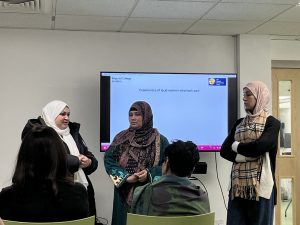
So, what’s next?
We are planning to work together to ensure parents are given appropriate and useful information about the pregnancy vaccine that is being introduced to protect babies against Respiratory Syncytial Virus (RSV). We want to carry on working together to help all children get protected against dangerous infectious diseases through vaccination and reduce inequalities.
This project was funded by HS’s National Institute for Health Research (NIHR), doctoral research fellowship award (NIHR300907): https://fundingawards.nihr.ac.uk/award/NIHR300907
Websites:
Mosaic Community Trust: https://www.mosaiccommunitytrust.org.uk/
Dr Helen Skirrow: https://www.imperial.ac.uk/people/h.skirrow
Previous PERC blogs:
Paper on study results
